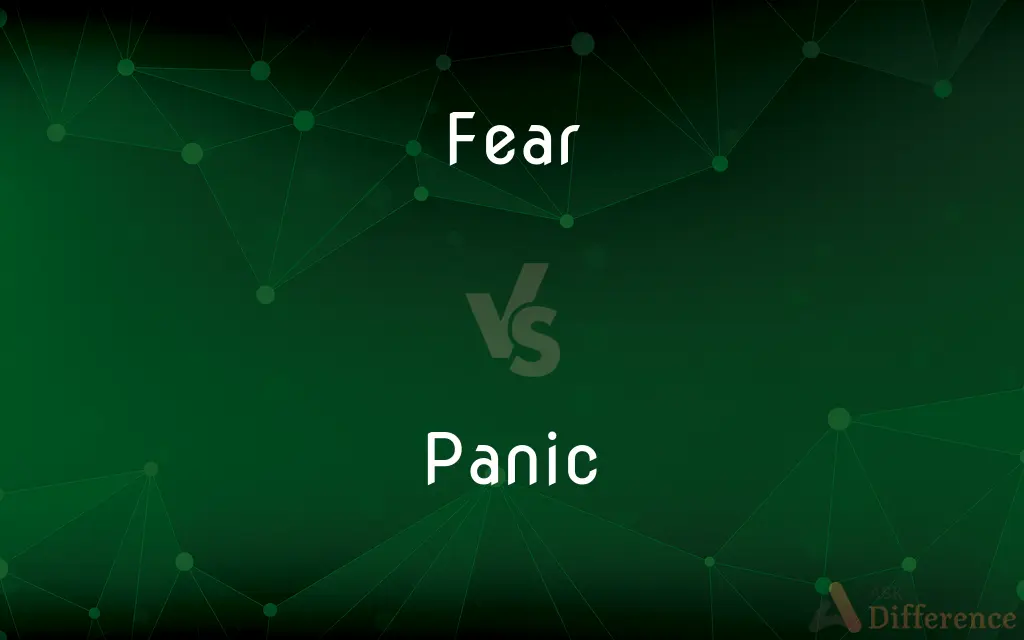Fear vs. Panic — What's the Difference?
By Maham Liaqat & Urooj Arif — Updated on April 3, 2024
Fear is an emotional response to perceived threats, invoking caution. Panic is an intense fear leading to irrational behavior, often without clear thinking.

Difference Between Fear and Panic
Table of Contents
ADVERTISEMENT
Key Differences
Fear is a basic human emotion experienced in anticipation of a potential threat, serving as a protective mechanism to encourage caution or avoidance behaviors. It often involves a cognitive assessment of danger, allowing for planned responses. Panic, however, is a heightened state of fear characterized by sudden and overwhelming anxiety that can result in hasty, uncoordinated, and irrational decisions, often in situations perceived as immediately life-threatening.
While fear can be triggered by both real and imagined threats, leading to varying degrees of anxiety and worry, panic is usually a reaction to an immediate perceived threat. Panic involves a more acute stress response, often leading to a fight, flight, or freeze reaction without the luxury of a thought-out strategy.
In terms of physiological response, fear activates the body’s fight or flight response, preparing an individual to either confront or flee from the threat. Panic, on the other hand, can escalate this response to a point where logical thinking and physical coordination are compromised, sometimes resulting in a complete freeze or shutdown.
Fear can be managed and often diminished through understanding the nature of the threat and rationalizing the fear response. Panic requires more immediate management techniques, such as breathing exercises or grounding techniques, to reduce the overwhelming anxiety and regain control of one's actions.
Socially, fear can be a shared emotion that strengthens group dynamics, as individuals come together to face a common threat. Panic can spread rapidly through groups, leading to mass hysteria or collective irrational actions, as seen in emergencies or crises without clear leadership or information.
ADVERTISEMENT
Comparison Chart
Definition
Emotional response to perceived threats.
Intense, overwhelming fear resulting in irrational behavior.
Trigger
Real or imagined threats.
Immediate perceived life-threatening situations.
Response
Planned avoidance or confrontation.
Hasty, uncoordinated decisions.
Physiological Effect
Activates fight or flight response.
Escalates response, impairing logic and coordination.
Management
Understanding and rationalizing the threat.
Immediate techniques to reduce overwhelming anxiety.
Social Impact
Can strengthen group dynamics against a common threat.
Can lead to mass hysteria or collective irrational actions.
Compare with Definitions
Fear
Response to Threats.
He felt fear when walking alone at night.
Panic
Overwhelming Anxiety.
Panic set in as the building began to shake during the earthquake.
Fear
Varies in Intensity.
The fear of failure motivates some to work harder.
Panic
Leads to Irrational Actions.
In panic, he forgot where he parked his car.
Fear
Protective Mechanism.
Fear of heights keeps people away from dangerous ledges.
Panic
Immediate and Acute.
News of the impending hurricane caused panic buying at supermarkets.
Fear
Socially Bonding.
Shared fears about the storm brought the community closer together.
Panic
Requires Immediate Management.
She used deep breathing to calm her panic during the flight.
Fear
Managed Through Understanding.
Learning about snakes reduced her fear of them.
Panic
Can Cause Mass Hysteria.
Rumors of a bank's failure triggered a panic withdrawal among customers.
Fear
Fear is an emotion induced by the perception or recognition of phenomena which can pose a danger or threat. Fear causes physiological changes and therefore may produce behavioral changes, such as mounting an aggressive response or fleeing the threat.
Panic
Panic is a sudden sensation of fear, which is so strong as to dominate or prevent reason and logical thinking, replacing it with overwhelming feelings of anxiety and frantic agitation consistent with an animalistic fight-or-flight reaction. Panic may occur singularly in individuals or manifest suddenly in large groups as mass panic (closely related to herd behavior).
Fear
A very unpleasant or disturbing feeling caused by the presence or imminence of danger
Our fears intensified as the storm approached.
Panic
A sudden, overpowering feeling of fear, often affecting many people at once.
Fear
A state or condition marked by this feeling
Living in constant fear of attack.
Saved as much as he could for fear of losing his job.
Panic
A state of extreme anxiety, such as that involved in a panic attack.
Fear
A feeling of disquiet or apprehension
A fear of looking foolish.
Panic
A state of frantic activity, usually accompanied by extreme concern or anxiety
The office was in a panic as the deadline approached.
Fear
A reason for dread or apprehension
Being alone is my greatest fear.
Panic
A sudden widespread alarm concerning finances, often resulting in a rush to sell property to raise cash.
Fear
Extreme reverence or awe, as toward a deity.
Panic
(Slang) A person or thing that is considered extremely funny.
Fear
To be afraid or frightened of
A boy who fears spiders.
Panic
Of, relating to, or resulting from sudden, overwhelming terror
Panic flight.
Fear
To be uneasy or apprehensive about
We all feared what we would see when the grades were posted.
Panic
Of or resulting from a financial panic
Panic selling of securities.
Fear
To consider probable; expect
I fear you are wrong. I fear I have bad news for you.
Panic
Often Panic(Mythology) Of or relating to Pan.
Fear
To revere or be in awe of (a deity, for example).
Panic
To affect or be affected with panic.
Fear
To be afraid
Your injury is minor. Don't fear.
Panic
Alternative case form of Panic
Fear
To be uneasy or apprehensive
We fear for the future of the business.
Panic
(by extension (see the etymology))
Fear
(uncountable) A strong, uncontrollable, unpleasant emotion or feeling caused by actual or perceived danger or threat.
He was struck by fear on seeing the snake.
Panic
Of fear, fright, etc: overwhelming or sudden.
Fear
(countable) A phobia, a sense of fear induced by something or someone.
Not everybody has the same fears.
I have a fear of ants.
Panic
Pertaining to or resulting from overwhelming fear or fright.
Fear
(uncountable) Terrified veneration or reverence, particularly towards God, gods, or sovereigns.
Panic
(uncountable) Overwhelming fear or fright, often affecting groups of people or animals; (countable) an instance of this; a fright, a scare.
Fear
(transitive) To be afraid of (something or someone); to consider or expect (something or someone) with alarm.
I fear the worst will happen.
Panic
; (by extension) any computer system crash.
Fear
(intransitive) To feel fear.
Never fear; help is always near.
Panic
A rapid reduction in asset prices due to broad efforts to raise cash in anticipation of such prices continuing to decline.
Fear
To worry about, to feel concern for, to be afraid for.
She fears for her son’s safety.
Panic
A highly amusing or entertaining performer, performance, or show; a riot, a scream.
Fear
(transitive) To venerate; to feel awe towards.
People who fear God can be found in Christian churches.
Panic
(originally) Foxtail millet or Italian millet (Setaria italica), the second-most widely grown species of millet.
Fear
(transitive) To regret.
I fear I have bad news for you: your husband has died.
Panic
(by extension) A plant of the genus Panicum, or of similar plants of other genera (especially Echinochloa and Setaria) formerly included within Panicum; panicgrass or panic grass.
Fear
To cause fear to; to frighten.
Panic
The edible grain obtained from one of the above plants.
Fear
To be anxious or solicitous for.
Panic
(transitive)
Fear
To suspect; to doubt.
Panic
To cause (someone) to feel fright]]; also, to frighten (someone) into acting hastily.
Fear
(dialectal) Able; capable; stout; strong; sound.
Hale and fear
Panic
(computing) To cause (a computer system) to crash.
Fear
A variant of Fere, a mate, a companion.
Panic
To highly amuse, entertain, or impress (an audience watching a performance or show).
Fear
A painful emotion or passion excited by the expectation of evil, or the apprehension of impending danger; apprehension; anxiety; solicitude; alarm; dread.
Fear is an uneasiness of the mind, upon the thought of future evil likely to befall us.
Where no hope is left, is left no fear.
Panic
(intransitive)
Fear
Apprehension of incurring, or solicitude to avoid, God's wrath; the trembling and awful reverence felt toward the Supreme Being.
I will put my fear in their hearts.
I will teach you the fear of the Lord.
Render therefore to all their dues; tribute to whom tribute is due . . . fear to whom fear.
Panic
To feel panic, or overwhelming fear or fright; to freak out, to lose one's head.
Fear
That which causes, or which is the object of, apprehension or alarm; source or occasion of terror; danger; dreadfulness.
There were they in great fear, where no fear was.
The fear of your adventure would counsel you to a more equal enterprise.
Panic
(computing) Of a computer system: to crash.
Fear
To feel a painful apprehension of; to be afraid of; to consider or expect with emotion of alarm or solicitude.
I will fear no evil, for thou art with me.
Panic
A plant of the genus Panicum; panic grass; also, the edible grain of some species of panic grass.
Fear
To have a reverential awe of; to be solicitous to avoid the displeasure of.
Leave them to God above; him serve and fear.
Panic
A sudden, overpowering fright; esp., a sudden and groundless fright; terror inspired by a trifling cause or a misapprehension of danger; as, the troops were seized with a panic; they fled in a panic.
Fear
To be anxious or solicitous for; now replaced by fear for.
The sins of the father are to be laid upon the children, therefore . . . I fear you.
Panic
By extension: A sudden widespread fright or apprehension concerning financial affairs.
Fear
To suspect; to doubt.
Ay what else, fear you not her courage?
Panic
Extreme or sudden and causeless; unreasonable; - said of fear or fright; as, panic fear, terror, alarm.
Fear
To affright; to terrify; to drive away or prevent approach of by fear.
Fear their people from doing evil.
Tush, tush! fear boys with bugs.
Panic
An overwhelming feeling of fear and anxiety
Fear
To be in apprehension of evil; to be afraid; to feel anxiety on account of some expected evil.
I exceedingly fear and quake.
Panic
Sudden mass fear and anxiety over anticipated events;
Panic in the stock market
A war scare
A bomb scare led them to evacuate the building
Fear
An emotion experienced in anticipation of some specific pain or danger (usually accompanied by a desire to flee or fight)
Panic
Be overcome by a sudden fear;
The students panicked when told that final exams were less than a week away
Fear
An anxious feeling;
Care had aged him
They hushed it up out of fear of public reaction
Panic
Cause sudden fear in or fill with sudden panic;
The mere thought of an isolation cell panicked the prisoners
Fear
A profound emotion inspired by a deity;
The fear of God
Fear
Be afraid or feel anxious or apprehensive about a possible or probable situation or event;
I fear she might get aggressive
Fear
Be afraid or scared of; be frightened of;
I fear the winters in Moscow
We should not fear the Communists!
Fear
Be sorry; used to introduce an unpleasant statement;
I fear I won't make it to your wedding party
Fear
Be uneasy or apprehensive about;
I fear the results of the final exams
Fear
Regard with feelings of respect and reverence; consider hallowed or exalted or be in awe of;
Fear God as your father
We venerate genius
Common Curiosities
Is panic always a negative reaction?
While panic is generally seen as negative due to its irrational nature and potential for harmful outcomes, it's a natural response that sometimes can lead to quick actions in emergency situations.
Can panic be contagious?
Yes, panic can spread rapidly among individuals, especially in crowded or group settings, leading to mass hysteria or collective irrational behavior.
How does panic affect decision-making?
Panic can severely impair decision-making, leading to hasty, uncoordinated, and often irrational choices that may exacerbate a dangerous situation.
Can fear lead to panic?
Yes, intense or unmanaged fear can escalate into panic, especially in situations perceived as immediately threatening.
How does the body react differently to fear and panic?
Fear triggers a fight or flight response preparing for a threat, while panic can escalate this response, impairing logical thinking and physical coordination.
Why is fear considered a protective mechanism?
Fear prompts caution or avoidance behaviors that can protect individuals from harm by encouraging a careful assessment of potential threats.
What is the main difference between fear and panic?
Fear is a cautious emotional response to perceived threats, while panic is an intense, overwhelming fear that often leads to irrational behavior.
How can one manage panic effectively?
Techniques such as deep breathing, grounding exercises, and seeking immediate support can help manage panic and regain control.
What role does understanding play in managing fear?
Understanding the nature of a threat can help rationalize and diminish fear, enabling better coping strategies and reducing anxiety.
What societal effects can fear and panic have?
While fear can strengthen social bonds against a common threat, panic can undermine societal cohesion, leading to chaos or irrational collective actions.
Share Your Discovery

Previous Comparison
Passionate vs. Passion
Next Comparison
Religious vs. SpiritualAuthor Spotlight
Written by
Maham LiaqatCo-written by
Urooj ArifUrooj is a skilled content writer at Ask Difference, known for her exceptional ability to simplify complex topics into engaging and informative content. With a passion for research and a flair for clear, concise writing, she consistently delivers articles that resonate with our diverse audience.
















































